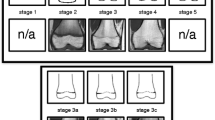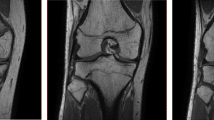Abstract
The contribution of magnetic resonance imaging to forensic age estimation of living individuals is a subject of ongoing research. Several studies have focused on the wrist, clavicle, knee, and foot, and shown interesting results regarding the 18-year threshold. Authors have developed various staging systems for epiphyseal growth plate maturation. However, the procedure is observer-dependent and requires experience and a certain time-learning process. To reduce these pitfalls, we have developed an automatic method based on the analysis of variations of gray levels within the epiphyseal–metaphyseal junction. This method was tested on 160 MRI scans of the distal tibial epiphysis in a sample of individuals aged from 8 to 25 years old, after intensity non-uniformity correction of all images. Results showed that in our sample, 97.4 % of males and 93.9 % of females aged 18 years or more would be correctly classified using this method. To our knowledge, automatic methods for MRI analysis have not been used in the field of age estimation yet. Further studies should be performed to assess the validity of this procedure.






Similar content being viewed by others
References
Cunha E, Baccino E, Martrille L, Ramsthaler F, Prieto J, Schuliar Y, Lynnerup N, Cattaneo C (2009) The problem of aging human remains and living individuals: a review. Forensic Sci Int 193:1–13
Ritz-Timme S, Cattaneo C, Collins MJ, Waite ER, Schütz HW, Kaatsch HJ, Borrman HIM (2000) Age estimation: the state of the art in relation to the specific demands of forensic practice. Int J Legal Med 113:129–136
Schmeling A, Olze A, Reisinger W, Geserick G (2001) Age estimation of living people undergoing criminal proceedings. Lancet 358:89–90
Schmeling A, Olze A, Reisinger W, Geserick G (2004) Forensic age diagnostics of living people undergoing criminal proceedings. Forensic Sci Int 144:243–245
Schmeling A, Geserick G, Reisinger W, Olze A (2007) Age estimation. Forensic Sci Int 165:178–181
Schmeling A, Grundmann C, Fuhrmann A, Kaatsch HJ, Knell B, Ramsthaler F, Reisinger W, Riepert T, Ritz-Timme S, Rösing FW, Rötzsher K, Geserick G (2008) Criteria for age estimation in living individuals. Int J Legal Med 122:457–460
Quirmbach F, Ramsthaler F, Verhoff MA (2009) Evaluation of the ossification of the medial clavicular epiphysis with a digittal ultrasonic system to determine the age threshold of 21years. Int J Legal Med 123:241–245
Schmidt S, Schmeling A, Zwiesigk P, Pfeiffer H, Schulz R (2011) Sonographic evaluation of apophyseal ossification of the iliac crest in forensic age diagnostics in living individuals. Int J Legal Med 125:271–276
Schmidt S, Schiborr M, Pfeiffer H, Schmeling A, Schulz R (2013) Age dependence of epiphyseal ossification of the distal radius in ultrasound diagnostics. Int J Legal Med 127:831–838
Schmidt S, Mühler M, Schmeling A, Reisinger W, Schulz R (2007) Magnetic resonance imaging of the clavicular ossification. Int J Legal Med 121:321–324
Hillewig E, De Tobel J, Cuche O, Vandemaele P, Piette M, Verstraete K (2011) Magnetic resonance imaging of the medial extremity of the clavicle in forensic bone age determination: a new four-minute approach. Eur Radiol 21:757–767
Hillewig E, Degroote J, Van der Paelt T, Visscher A, Vandemaele P, Lutin B, D’Hooghe L, Vandriessche V, Piette M, Verstraete K (2013) Magnetic resonance imaging of the sternal extremity of the clavicle in forensic age estimation : towards more sound age estimates. Int J Legal Med 127:677–689
Dvorak J, George J, Junge A, Hodler J (2007) Age determination by magnetic resonance imaging of the wrist in adolescent male football players. Br J Sports Med 41:45–52
Dvorak J, George J, Junge A, Hodler J (2007) Application of MRI of the wrist for age determination in international U-17 soccer competition. Br J Sports Med 41:497–500
Dvorak J (2009) Detecting over-age players using wrist MRI: science partnering with sport to ensure fair play. Br J Sports Med 43:884–885
George J, Nagendran J, Azmi K (2012) Comparison study of growth plate fusion using MRI versus plain radiographs as used in age determination for exclusion of overaged football players. Br J Sports Med 46:273–278
Dedouit F, Auriol J, Rousseau H, Rougé D, Crubézy E, Telmon N (2012) Age assessment by magnetic resonance imaging of the knee: a preliminary study. Forensic Sci Int 217:232.e1–232.e7
Jopp E, Schröder I, Maas R, Adam G, Püschel K (2010) Proximale tibiaepiphyse im magnetresonanztomogramm. Neue Möglichkeit zur Altersbestimmung bei Lebenden? Rechtsmedizin 20:464–468
Saint-Martin P, Rérolle C, Dedouit F, Bouilleau L, Rousseau H, Rougé D, Telmon N (2013) Age estimation by magnetic resonance imaging of the distal tibial epiphysis and the calcaneum. Int J Legal Med 127:1023–1030
Lynnerup N, Belard E, Buch-Olsen K, Sejrsen B, Damgaard-Pedersen K (2008) Intra- and interobserver error of the Greulich–Pyle method as used on a Danish forensic sample. Forensic Sci Int 179:242.e1–242.e6
Schmeling A, Schulz R, Reisinger W, Mühler M, Wernecke KD, Geserick G (2004) Studies on the time frame for ossification of the medial clavicular epiphyseal cartilage in conventional radiography. Int J Legal Med 118:5–8
Cameriere R, De Luca S, De Angelis D, Merelli V, Giuliodori A, Cingolani M, Cattaneo C, Ferrante L (2012) Reliability of Schmeling’s stages of ossification of medial clavicular epiphyses and its validity to assess 18years of age in living subjects. Int J Legal Med 126:923–932
Bellon EM, Haacke EM, Coleman PE, Sacco DC, Steiger DA, Gangarosa RE (1986) MR Artifacts: a review. Am J Roentgenol 147:1271–1281
McKern TW, Stewart TD (1957) Skeletal age changes in young American males analyzed from the standpoint of age determination. Technical Report EP-45. Environmental Protection Research Division, HQ=Quatermaster Research and Development Command, United States Army, Natick, MA
Scheuer L, Black SM (2000) Developmental juvenile osteology. Elsevier/Academic, Amsterdam
Bass W (2005) Human osteology—a laboratory and field manual of the human skeleton. Archaeological Society, Columbia
Cardoso HF (2008) Epiphyseal union at the innominate and lower limb in a modern Portuguese skeletal sample, and age estimation in adolescent and young adult male and female skeletons. Am J Phys Anthropol 135:161–170
Davies DA, Parsons FG (1927) The age order of the appearance and union of the normal epiphyses as seen by X-rays. J Anat 62:58–71
Flecker H (1932) Roentgenographic observations of the times of appearance of epiphyses and their fusions with the diaphyses. J Anat 67:118–164
Hoerr NL, Pyle SI, Francis CC (1962) Radiographic atlas of skeletal development of the foot and ankle—a standard of reference. Thomas, Springfield
Ogden JA, McCarthy SM (1983) Radiology of postnatal skeletal development. VIII. Distal tibia and fibula. Skelet Radiol 10:209–220
Banerjee KK, Agrawal BB (1998) Estimation of age from epiphyseal union at wrist and ankle joints in the capital city of India. Forensic Sci Int 98:31–39
Crowder C, Austin D (2005) Age ranges of epiphyseal fusion in the distal tibia and fibula of contemporary males and females. J Forensic Sci 50:1001–1007
Belaroussi B, Milles J, Carme S, Zhu YM, Benoit-Cattin H (2006) Intensity non-uniformity correction in MRI: existing methods and their validation. Med Imaging Anal 10:234–246
Sled JG, Zijdenbos AP, Evans AC (1998) A nonparametric method for automatic correction of intensity nonuniformity in MRI data. IEEE Trans Med Imaging 17:87–97
Tustison NJ, Avants BB, Cook PA, Zheng Y, Egan A, Yushkevich PA, Gee JC (2010) N4ITK: improved N3 bias correction. IEEE Trans Med Imaging 29:1310–1320
Fedorov A, Beichel R, Kalpathy-Cramer J, Finet J, Fillion-Robin JC, Pujol S, Bauer C, Jennings D, Fennessy F, Sonka M, Buatti J, Aylward S, Miller JV, Pieper S, Kikinis R (2012) 3D Slicer as an image computing platform for the Quantitative Imaging Network. Magn Reson Imaging 30:1323–1341
Boyes RG, Gunter JL, Frost C, Janke AL, Yeatman T, Hill DLG, Bernstein MA, Thompson PM, Weiner MW, Schuff N, Alexander GE, Killiany RJ, DeCarli C, Jack CR, Fox NC for the ADNI Study (2008) Intensity non-uniformity correction using N3 on 3-T scanners with multischannel phased array coils. Neuroimage 39:1752–1762
R Development Core Team (2008) R: a language and environment for statistical computing. R Foundation for Statistical Computing, Vienna, Austria, ISBN: 3-9000051-07-0 http://www.R-project.org
Iscan MY (1989) Age markers in the human skeleton. Thomas, Springfield
Brewer JB, Magda S, Airriess C, Smith ME (2009) Fully-automated quantification of regional brain volumes for improved detection of focal atrophy in Alzheimer disease. AJNR Am J Neuroradiol 30:578–580
Chupin M, Gérardin E, Cuingnet R, Boutet C, Lemieux L, Lehéricy S, Benali H, Garnero L, Colliot O, the Alzheimer’s Disease Neuroimaging Initiative (2009) Fully automatic hippocampus segmentation and classification in Alzheimer’s disease and mild cognitive impairment applied on data from ADNI. Hippocampus 19:579–587
Cuingnet R, Gerardin E, Tessieras J, Auzias G, Lehéricy S, Habert MO, Chupin M, Benali H, Colliot O, The Alzheimer’s Disease Neuroimaging Initiative (2011) Automatic classification of patients with Alzheimer’s disease from structural MRI: a comparison of ten methods using the ADNI database. Neuroimage 56:766–781
Constantinides C, Roullot E, Lefort M, Frouin F (2012) Fully automated segmentation of the left ventricle applied to cine MR images: description and results on a database of 45 subjects. Conf Proc IEEE Eng Med Biol Soc 2012:3207–3210
Conflict of interest
The authors declare that they have no conflict of interest.
Author information
Authors and Affiliations
Corresponding author
Rights and permissions
About this article
Cite this article
Saint-Martin, P., Rérolle, C., Dedouit, F. et al. Evaluation of an automatic method for forensic age estimation by magnetic resonance imaging of the distal tibial epiphysis—a preliminary study focusing on the 18-year threshold. Int J Legal Med 128, 675–683 (2014). https://doi.org/10.1007/s00414-014-0987-z
Received:
Accepted:
Published:
Issue Date:
DOI: https://doi.org/10.1007/s00414-014-0987-z




